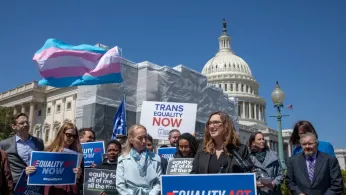
4 hours ago
Sarah McBride Calls Out Colleagues After Defense Bill Amendments Supporting Queer Troops Blocked
READ TIME: 3 MIN.
Representative Sarah McBride (D-DE), the first openly transgender member of Congress, has condemned the actions of her colleagues after all of her amendments to the 2026 National Defense Authorization Act (NDAA) were blocked in committee, many before even reaching a full Senate vote. The amendments, which aimed to bolster protections for transgender military personnel and address systemic barriers faced by LGBTQ+ service members, were rejected in a contentious legislative session that exposed deep divisions on issues of inclusion and equity in U.S. defense policy .
McBride’s proposed amendments to S.2296, the NDAA for FY2026, included measures to prevent discrimination against transgender people in the armed forces, guarantee access to medically necessary gender-affirming care for service members, and establish a task force to address harassment and bias against LGBTQ+ personnel within military ranks . One amendment sought to reverse recent restrictions on transgender service, which advocates argue have led to unwarranted discharges and compromised morale among troops.
Despite broad support from LGBTQ+ advocacy groups and a coalition of Democratic legislators, all of McBride’s amendments were blocked in committee, preventing them from appearing in the final version of the bill set for Senate consideration .
Following the committee’s decisions, McBride delivered an impassioned statement on Capitol Hill: “By blocking these amendments, my colleagues are betraying those who volunteer to wear the uniforms of the U.S. military. Every service member deserves respect, dignity, and access to the care they need. Our national defense is strongest when we value every individual who serves” .
McBride also called on the Senate Armed Services Committee to reconsider its approach, emphasizing the real-world impact of exclusionary policies on recruitment, retention, and the well-being of LGBTQ+ military families. “This is about more than policy—it’s about people’s lives and their right to serve their country authentically,” she said .
The NDAA has long served as a battleground for debates over the rights of LGBTQ+ service members. While incremental progress has been made in recent years—including the reversal of the transgender military ban in 2021 and expanded healthcare provisions—advocates argue that many policies remain vulnerable to partisan rollback.
Recent efforts to codify protections have faced stiff resistance from some lawmakers, particularly within the Republican caucus. The committee’s decision to block McBride’s amendments follows a pattern of opposition to proposals perceived as advancing LGBTQ+ rights in the defense sector, with critics arguing such measures are “unnecessary” or “disruptive” to military readiness .
National LGBTQ+ advocacy organizations, including the Human Rights Campaign and Lambda Legal, have voiced strong support for McBride’s stance, warning that continued exclusion perpetuates discrimination and undermines unit cohesion. “Transgender service members have proven their dedication and professionalism time and again,” said a spokesperson for the Human Rights Campaign. “Blocking these amendments sends a chilling message to anyone who seeks to serve openly” .
Military families and veterans groups have echoed these concerns, sharing stories of service members affected by discriminatory practices and calling on Congress to adopt more inclusive policies. “Our military should reflect the diversity and values of our nation. These setbacks only delay progress,” said a representative from the Modern Military Association of America .
As the NDAA moves forward, McBride and her allies are expected to continue pressing for floor debate and public hearings on the blocked amendments. Some Democratic lawmakers have signaled willingness to introduce similar provisions through separate bills or as riders in future appropriations legislation.
In the meantime, advocacy groups plan to mobilize public support through letter-writing campaigns, social media outreach, and partnerships with veteran organizations. “We will not be silent while our rights are dismissed in the name of political expediency,” McBride vowed, encouraging constituents to contact their representatives and demand accountability .






